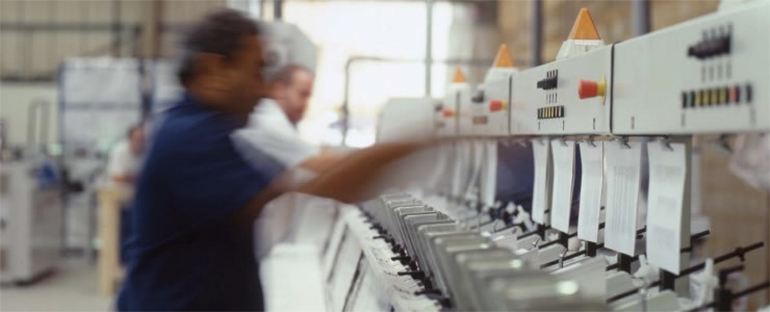Temporary Workers in the Print Industry
Temporary workers in the Print Industry are a common practice. The shift toward leaner operations means that many print companies have to flex manning to cope with peak demand. Typically their options are either overtime or using temporary workers.
Where the demand is very time specific, very often overtime is not an option because the staff are already working. Also certain services are widely outsource or not needed 7 days a week which creates a need for temporary workers in the print industry e.g. large format installation work.
Peak periods vary depending on which sector of the print industry and also can be contract specific. However we have noticed that May/June and then the run up to Christmas from September are particularly busy times as the demand for print increases. Summer is not always as busy as you may expect as although companies need holiday cover the workload can decrease so that can balance each other out.
Printing companies can employ workers on temporary contracts directly in which case they could advertise. This can be effective where the print employer has a good understanding of their future demand; i.e. what the requirement will be, when and for how long with plenty of forewarning. In practice however we find that many employers need to turn to temporary workers in the print industry at very short notice and it is then that using an agency with in-depth knowledge of the print industry and contacts for skilled workers really adds value. We find that very often there simply isn’t time to advertise; print employers need skilled staff, such as press minders or print finishers that can walk in and start within a matter of days. Indeed in the extreme we have taken a call mid afternoon and had a temp onsite for a night shift with the client the same evening, literally 3 or 4 hours later. I’m not saying a print company couldn’t achieve that directly but they usually don’t have the range of contacts or time to bring someone in that quickly. To be effective you can’t just have the number of one press minder, print finisher or repro guy who does a bit of temping or freelancing because they may be on another assignment when you need them.
The other element to consider is the hassle of employment contracts and payroll. Particularly if the temporary worker is need for only a few days or possible a few weeks many employers find the hassle of contracts and payroll are onerous compared to calling in an agency.
Roles for Temporary Workers in the Print Industry
Some companies do use temps for unskilled office admin and warehouse work but realistically, in the print industry, most production roles, including repro and graphic design, press minders and print finishers, involve some level of print industry specific skills. We specialise in these print specific skilled workers and so know that temporary workers in the print industry can be provided for the following roles:
– Graphic design
– Repro / retouching etc.
– Press minders for all processes: litho, gravure, flexo, digital
– Print finishing including guillotine, folding, carton gluing, bindery, and large format finishing
– Large format and POS / POP installations
Any employee employed directly by an organisation immediately accrues statutory rights such as statutory holidays. They will also have to have a notice period and the risk for the employer if they want to be able to terminate the employee at short notice the employee could do the same. With regard to employment contracts they could either take staff on a normal open-ended contract or on a fixed term contract. If the employee feels they have a permanent contract and is then dropped they are likely to be unwilling to return to that employer, and it could damage their reputation to be seen as “Hire and Fire”. With fixed term contracts the employer has the risk of the demand being shorter or longer than the proposed contract.
For the employer, temporary workers in the print industry supplied via and agency don’t require the same notice periods as permanent staff.
However the Agency Workers Directive protects employees supplied via an agency. In essence this provides that agency workers are entitlement to the same conditions as a “comparable (directly employed permanent) worker” after a qualifying period of 12 weeks with the same employer. In practice we find very few print industry temporary placements qualify.
It has been argued that agency / temporary workers in the print industry and other industries are used a cheap labour. Our experience of the print industry does not bear this out and for good reason. Good temporary workers are usually highly skilled and very adaptable. Employers want someone who can walk in, walk up to a workstation, press, guillotine etc. and start work with virtually no training and the minimum of fuss. People with these skills and this adaptability aren’t cheap labour. Add to this the relative insecurity temps live with in terms of not knowing where or when they will be working beyond and matter of weeks ahead and it is clear that they have to be reasonably paid.
Where an agency provides staff the employer pays the agency fee. This is incorporated in the differential between what the employer pays and what the temporary worker is paid. This differential also covers the costs associated with employing the temp including holiday pay, running payroll and contracts as the temp effective becomes an employee of the agency.
The typical tenure of a temporary contract is incredibly varied. We have had everything from a day to 18 months. More often than not it will be anywhere from a week to a month and so most print employers find the administration of setting up temporary workers on their own payroll simply isn’t worth it.
Generally we would advise employers in the print industry that unless you have very predictable demand peaks and the administration capacity to manage contracts and payroll it is probably better to use an agency for temporary staff.
If you need a basic administrator you can use just about any high street temp agency. However where you need someone with print industry skills is essential you use a specialist with in-depth knowledge and broad industry contacts. Most generalist agencies simply don’t understand the skills required and perhaps more to the point won’t have the depth of talent to draw upon a short notice. We find most print industry employers are looking for temporary workers who can start within a mater of days. Advertising is rarely an option so you need an agency used to supplying the skill staff you need with plenty of them on file to call upon.
Obviously the more notice you can give the broader the talent pool available. Moving on from that provide as much information as you can about skills and knowledge required and how much flexibility you have on skill sets. E.G. Do they need to be able run a Heidelberg XL75 specifically or will you look at good B2 Printers.
Whilst temporary workers in the print industry are paid in arrears like anyone else it is usually less than a week in arrears and often as fast as 3 days in arrears so make sure you pay your agency promptly. If you are relying on an agency to provide quality staff at the drop of a hat you need to maintain a good relationship with them. Making them wait for payment for weeks after they have paid the temporary worker is not conducive to that.
When temporary worker starts you naturally want them to be up to speed quickly and don’t expect to have to provide extensive training. However don’t skimp on induction and health and safety briefings. These don’t need to be long but do make sure the temporary worker is provided with adequate safety equipment and knows where fire exits are and any hazards they may encounter etc.
















